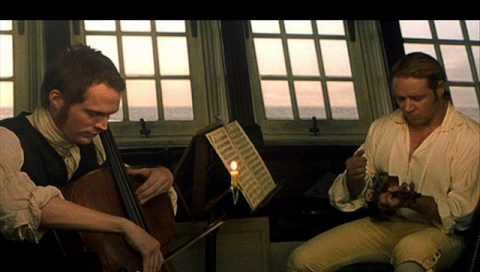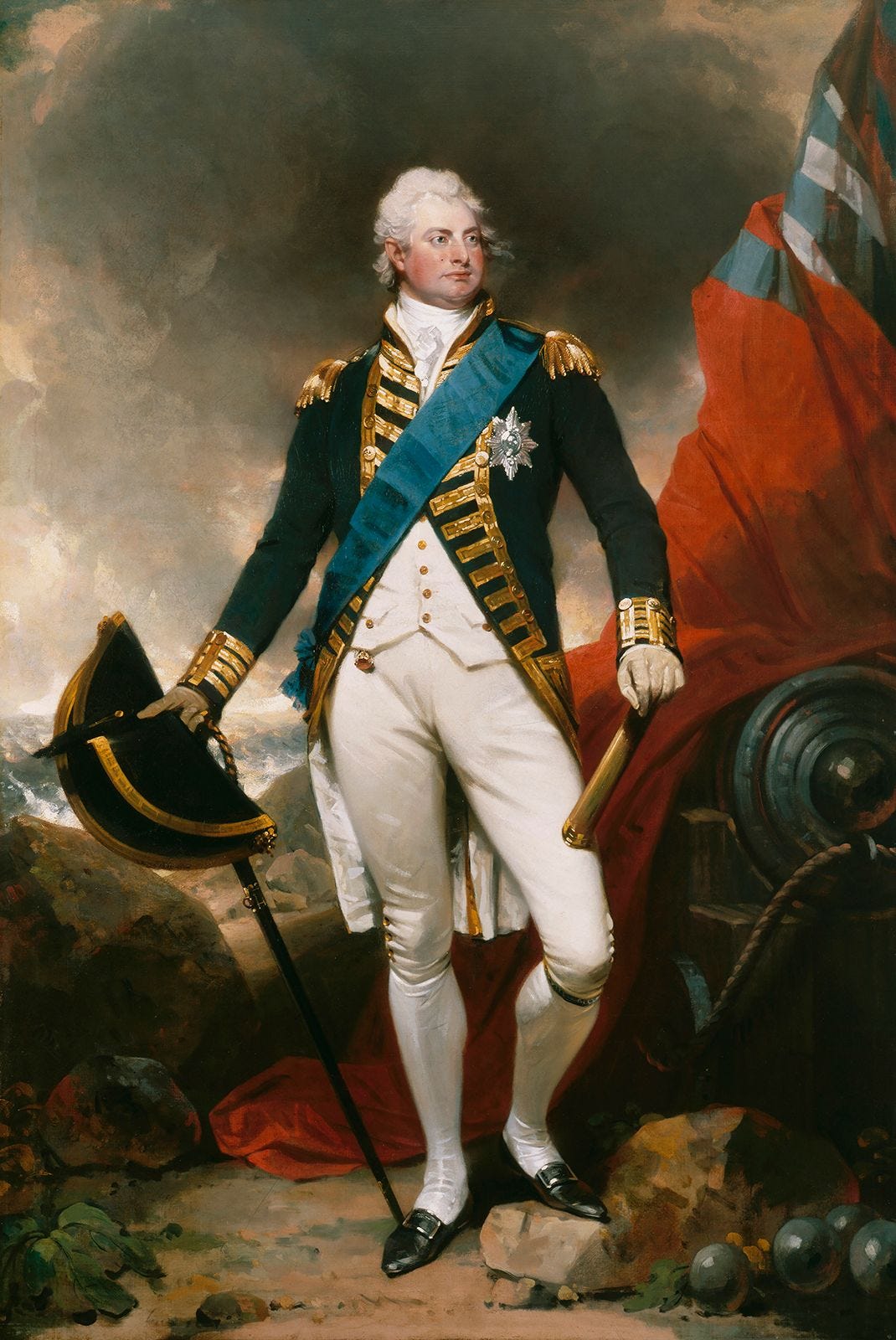“Waving, waving…” The penultimate novel in the Aubrey-Maturin series ends with an ellipsis, as though the 84-year-old O’Brian was in doubt of whether the series would continue, except perhaps in the reader’s imagination. Yet another novel was to follow, in some ways a return to form, in many ways a retread of familiar territory. The Hundred Days ends with Napoleon’s defeat and Jack and company launched on a new, postwar mission to help Chile liberate itself from Spanish rule; at the start of Blue at the Mizzen, however, our storyteller seems to rethink things, saying in effect, Not so fast. The Surprise collides with a timber ship and must return to Gibraltar for repairs. There, as in the very first novel, Jack embarks on a self-destructive affair with his commanding officer’s wife; meanwhile, Stephen awkwardly woos Christine Wood by letter, as he once wrote to Diana; he even returns, a bit half-heartedly, to his old vice of diary-keeping. Jack’s dalliance with his admiral’s wife ends up accelerating his return to sea; the crafty Lord Barmouth realizes that the best way to get rid of his rival is to make sure that the Surprise is repaired as swiftly as possible. But even after leaving Gibraltar the ship needs further repairs, again delaying the mission—delayed further when it’s discovered that the only competent shipyard in nearby Madeira has (in)conveniently burned down. And so O’Brian laboriously engineers a return to England, so that we can check in for a last time with favorite supporting characters, in a succession of scenes that function as a kind of “where are they now” epilogue to the series. Sir Joseph Blaine continues as spymaster and happy bachelor; Sarah and Emily Sweeting are now gifted cooks and valued employees of Mrs. Broad, the innkeeper of the Grapes; Clarissa Oakes is now Clarissa Anderson, having met and married a bookish clergyman—what he knows or doesn’t know about her past, and what their conjugal life might be like, would make a novel in itself. (Also, let me here mention that later in the book a friendly encounter with an American ship brings news of our old friend Michael Herapath, the lovelorn stowaway from Desolation Island, and his success as both medical man and the author of a book of translations of Chinese poetry. Happy endings for all!)
Meanwhile Jack returns home for a visit with Sophie, his twin daughters, his son George (now a midshipman for Jack’s old pal Heneage Dundas), and even his half-brother Philip. After a pastoral interlude at Woolcombe, our heroes return to London, where they are prevailed upon by none other than the endearingly awkward Duke of Clarence, the future William IV, to accept his natural son Horatio Hanson as a young gentleman aboard the Surprise. I was braced throughout the novel for something awful to happen to the ingenuous young man with a gift for mathematics—who can forget the awful fate of the talented oboist Mr. Midshipman Geoghegan, killed when he falls from the yards in Desolation Island? But O’Brian, having been so merciless in the preceding novel, spends most of Blue at the Mizzen in a benignant if not valedictory mood, and Hanson survives the action unscathed.
So far, so familiar: romantic intrigue, working up the ship, a domestic interlude, some light intelligence work, and the introduction of new characters. It’s perfectly enjoyable, and in the second half of the book we get the usual dual plot, with Jack’s efforts to build up the Chilean navy counterpointed by Stephen’s typically unsuccessful yet far from hopeless wooing of Christine. There is plenty of exciting action, including the obligatory climactic sea battle in which Jack is wounded cutting out a Peruvian warship, but there’s an inescapable lowering of stakes now that Napoleon has been vanquished. There is really only one question left unanswered, and the title of the novel answers it: Will Captain Jack Aubrey hoist his flag as Admiral Aubrey at last?
In the meantime we get a perfunctory stab at the most classic structure for an Aubrey-Maturin novel, by which the byplay between the two men is contrasted with the failed masculinity of a third character, a certain Sir David Lindsay. From the beginning of the series, the dynamic of these unlikely friends has been highlighted by some third character, usually a “man of parts” brought up short by some defect of character. The implicit argument of the series is that no man is an island: what saves Jack from his own defects of character, as well as the more structurally dehumanizing defect of being imbued with godlike authority, is his friendship with Stephen; Stephen’s own defects of intellectual arrogance and self-conscious isolation are in turn redeemed by Jack’s unvarnished love. Men without such friendships—which is to say, most men—fare badly by comparison. James Dillon, in Master and Commander, cannot bring himself either to fully re-establish his bond with Stephen nor admit friendship with his bluff John Bull of a captain; he literally dies trying to overcome his own sense of being divided against himself. The relationship between Lord Clonfert and Dr. McAdam in The Mauritius Command is a kind of parody of the one between Jack and Stephen, lacking the crucial ingredient of mutual respect; Clonfert, confronted with his own hollowness, dies like Dillon, but in even more excruciating and humiliating circumstances. The superficially impressive traitor Andrew Wray, whose need to hide his homosexuality acts as a kind of accelerant to his malevolence, ends up a specimen on Stephen’s dissection table. And so it goes.
Sir David makes for a decidedly lesser example of one of these counterheroes; he appears to be a lesser coinage on the figure of Lord Cochrane, the real-life naval hero upon whom the character of Jack Aubrey was modeled. Having been kicked out of the Royal Navy for challenging his own admiral to a duel, the proud and hotheaded Lindsay seeks redemption, or at any rate employment, by leading his own expedition to Chile. It seems at first as though he and Aubrey will end up on opposite sides, each supporting a different Chilean faction, but Lindsay ends up agreeing to work with Jack’s squadron, setting him up to be a difficult subordinate rather than an outright opponent. But even this potential conflict dries up and blows away; Lindsay ends up dying offstage in yet another duel, this time with one of his own officers. At this late date in the series, readers don’t need too much of a reminder of the folly of the sort of insecure masculinity which Lindsay, Wray, Clonfert, et al represent. O’Brian seems to have conjured Lindsay out of habit rather than any dramatic or thematic necessity. More meaningful is young Horatio Hanson’s arc from the embarrassed, semi-acknowledged bastard son of the Regent to self-confident seaman under Jack’s kind mentorship. Neither Jack nor Stephen are exemplary fathers, but throughout the series we see them successfully mentoring younger men with a beguiling blend of authority and tenderness.
We knew it was coming but it feels nearly as abrupt as the death of Diana when, on the next to last page, Stephen presents Jack with the news that he has been ordered to “join the South African squadron: you will go aboard HMS Implacable, hoisting your flag, blue at the mizzen and take command of the blue squadron.” Jack’s response to this news reminds me of his response to his having been promoted to commander in Master and Commander, when he has to re-read the letter appointing him several times before it sinks in, and then finds himself exploding with a joy he needs to share. That joy proves great enough, in the first novel, to wipe away his resentment of Maturin for having shushed him during the concert at the Governor’s house; the joy of promotion and the friendship in a sense create one another. At the conclusion of the series something similar happens, but O’Brian plays it with characteristic lightness:
Jack sat down, bowing his face in his hands: he was almost unmanned, but after a moment he did say, “Read that again, will you, Stephen?”
Stephen did so, and Jack said, “By God, Stephen, I am so glad it was you brought me this news. Sophie will be so happy. By God, I never thought my flag would come.”
After a few other tidbits of news, Stephen says to Jack very simply, “May I too congratulate you, Admiral dear?” And they embrace.
Note that almost unmanned. In O’Brian’s de facto all-male world, to be unmanned is a terrible fate, but far more terrible is to be cut off from tenderness. In this final scene, O’Brian quietly underlines his hero’s dependence on others. Jack Aubry is a man’s man, and no mistake. He is also deeply embedded in a web of relationships with the binding force of marriage: to Sophie, yes, and to the Royal Navy, and above all to Stephen. This scene reads to me as the consummation of the all too rare alchemical wedding by which a man might be reconciled to his complete nature. War and medicine, guile and open-heartedness, music and ambition, book-learning and seamanship, art and science, all balanced together. In these two men of the Romantic Enlightenment we have something like the many-minded man of Homer’s epic, and one of the most perfect pictures of love in literature.







